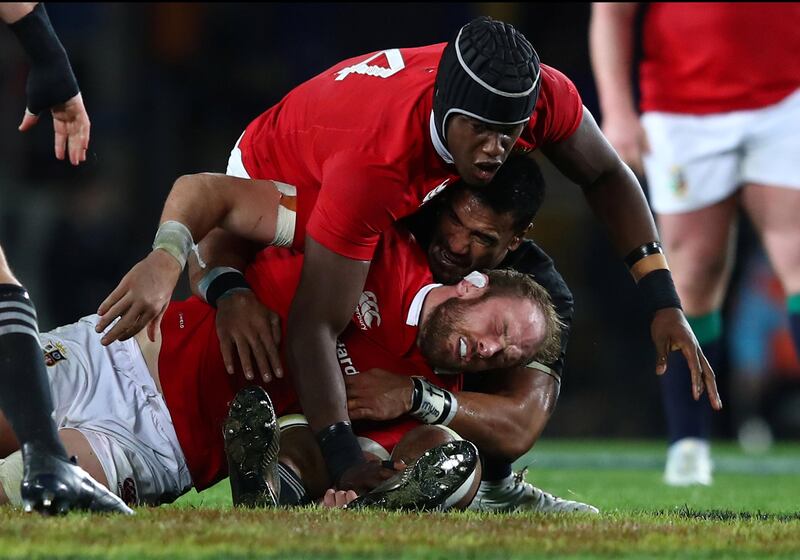The British & Irish Lions tour of New Zealand was a captivating spectacle for the sport. It did little for the perception the game is serious about head injury care, though.
In the third Test, with the series on the line, Alun Wyn Jones appeared to be knocked out. He left the field for the mandatory concussion test and, to no-one’s great surprise, reappeared to fight the Lions’ brave rearguard.
This was a case of perception being as important as reality. High definition close-ups showed Jones suffering a strike to the head, and appearing dazed and lost thereafter. Yet, a few minutes later, he was permitted back into the fold.
Alun Wyn Jones getting hit
Most observers concluded the prevailing head injury assessment (HIA) protocols were not fit for purpose. And that was at the top of the professional game, with the best medical care money can buy.
So what of the amateur game, where not every fixture can possibly be monitored by doctors highly qualified in head injuries? Are players at greater risk?
UAE Rugby instructs its referees to remove players showing any symptoms of concussion immediately and permanently, following World Rugby’s recommendation that, “if you think they’re out, sit them out.”
The decision to remove the player is that of their team in the first instance, but the referee can and will be expected to override decisions.
'Concussion in rugby' series
- Stephen Hamilton to defy medical advice and play on
- Story of a former Wales starlet cut down in his prime
According to Tim Fletcher, one of the few qualified medical educators involved in UAE rugby, people are slowly becoming wise to the potentially catastrophic effects of head injuries in rugby.
Fletcher, a former UAE fullback, now runs BounceBack Physiotherapy, who provide medical services for Abu Dhabi Saracens.
He says medical staff have a duty to stand up for player welfare, no matter what pressures are put on them by outside sources.
"From my point of view, being an old player myself, if the players are educated about concussion and its effects, they are more willing to come off the field,” Fletcher said.
“If they don’t have the knowledge of the damage that can be done – because it is a brain injury – people are still very reluctant, as are coaches, parents, onlookers.
“That is an ongoing education process for the whole community. We cop stick for removing players, especially if they are good players, but it just has to be done.
“I don’t mind copping a bit of stick if I am doing the right thing on a medical basis.”

Fletcher estimates there is at least one concussive injury in every senior match. “Whether or not that is recognised, and the player is removed is a different story,” he said.
Since 2015, temporary substitutions have been permitted in elite level matches, in which medical staff have a 15-minute window to make head injury assessments of players. Pass those cognitive function tests, and they are free to return.
Much of the criticism after the third Lions Test related to the HIA tests not being rigorous enough, but Fletcher refutes the idea.
Also read:
Paul Radley: Meet two UAE stars whose careers were cut short by concussion
“You can’t fluke that test,” he said. “There are questions based on short-term, medium-term and long-term memory, and also some random questions mixed in there.
“It is not like, which some people have done in the past, where you ask these questions in pre-season and somebody can memorise the answers.
“There is none of that now. It is based on things that were happening 10 minutes ago in the game, and an hour ago in the first half. There is no way it can be fluked.”






